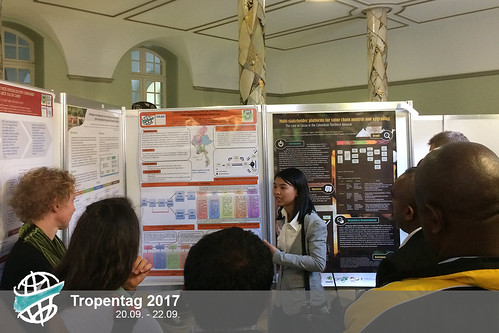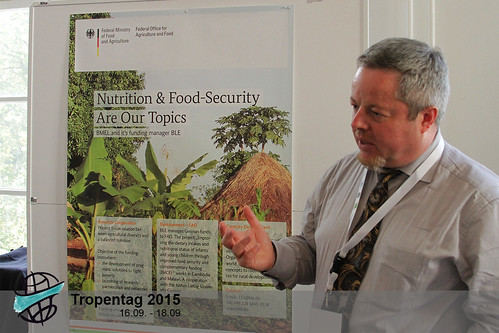sustainability

Value Chains are Valuable
Fri, 09/22/2017 - 11:38 — Hana KhanhValue chains is the hot topic currently in agricultural economics. As a result, not surprisingly, many people came to the poster session, although it was organized very late in the afternoon of the second day, just before the biggest event of the conference, the "Gala dinner’’.

This year, there were up to 15 posters registered, and they had only one hour to present their work. I felt very positive as I learned about the many attempts to find the bottlenecks in the value chains of tropical and sub-tropical products in developing countries, perhaps leading to new suggestions and solutions for farmers. While Sham UI Haq and Yee Mon Aung worked on rice and pulses in Myanmar, Hazal Akcakara from the University of Bonn, evaluated the impact of sustainability certification on palm oil.
Terraces, Tenure and Tea
Thu, 09/21/2017 - 10:28 — schumacherlydiaAfter the interesting and inspiring first day at Tropentag 2017, people dragged themselves out of their beds to the AULA at the University of Bonn for today's morning poster session about land use and land use changes. Andreas Brueckert, head of the department of Organic Plant Production at the University of Kassel, guided us charmingly through the jungle of posters. Personal eye- and ear-catchers for me were the presentations on how the future of tea in Malawi depends on the changing climate, tenure influences land conservation, and sustainable land management works in the fragile political context of Northern Afghanistan.
As the presenter did not show up, Andreas, who was well-prepared quickly took over and concisely explained the study. He spiced it up with facts he already knew from his own research, like one major obstacle for planting trees in the socio-ecological context is the change in ownership. The one who plants the tree automatically owns it. Therefore, land tenure hinders the implementation of land conservation methods, slowing afforestation in communal land.
Christian, demonstrated another threat, not to trees but to tea. During an intensive modelling study he and his colleagues investigated the impact of climate change to tea production in Malawi. Whereas just few areas can sustain their production with incremental adaptation, large areas are at risk. As tea is an important crop for agriculture in Malawi, this outcome poses a big challenge for both farmers and researchers, as resilient varieties are needed.
"Nutrition & Food Security are Our Topics"
Sat, 09/19/2015 - 11:18 — Philip TestroetI talked to Mr Siegfried Harrer of the Federal Office for Agriculture and Food (BLE) – an office that is subordinate to the Federal Ministry of Food and Agriculture (BMEL) with German Federal Minister for Food and Agriculture Schmidt. BMEL is one of the donors of Tropentag 2015. Harrer said that BMEL is spending 8.5 million Euros on 8 different science projects this year. The main interest of BLE being at Tropentag is to get in contact with other organizations and researchers. They organize workshops for local farmers around the world. Furthermore they have upcoming possibilities for young scientists from developing countries to get grants. 
Earthworms and yam beans: feeding fish in the future
Fri, 09/19/2014 - 16:16 — Pin Pravalprukskul (Continue...)
(Continue...)
Göttigen and Kassel Universities Collaborate to host the Tropentag Conference 2012
Wed, 09/19/2012 - 19:47 — De-Registered UserThe Tropentag conference this year has been organized by the Universities of Göttigen and Kassel that are currently cooperating in green areas of research. This cooperation between the 2 universities started in 2005 with synergies that extend to shared professorships and a joint Masters’ Programme on Sustainable International Agriculture that focuses on 3 key areas of agriculture: international organic agriculture, tropical agriculture and agribusiness and rural development economies. The joint research focuses on agroecological problems and the resilience of food production systems which is the theme of the tropentag this year.
Where was your bread last night?
Sat, 09/25/2010 - 09:54 — De-Registered UserTropentag Conference Dinner
Thu, 09/16/2010 - 11:48 — De-Registered User




